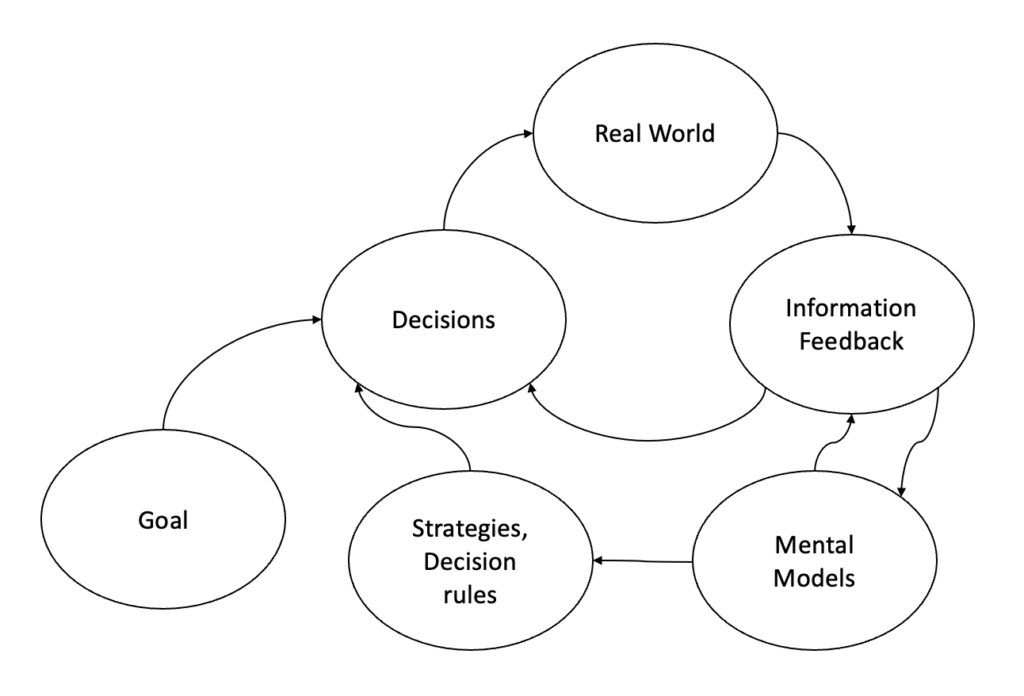“All learning is dependent on feedback”
John Sterman, Business Dynamics
Feedback loops are essential to learning. Let’s look at the simplest form of learning: we have a goal, we observe the current state of the world and take decisions to move it towards our goal. Our decisions impact the real world and provides us feedback. We use this feedback to change our decisions (learning) to try and more effectively move the world towards our goal, and so on.
We can draw the system diagram* for this ‘single-loop’ learning this way:

This single-loop of learning depends on iteration and is the most common form of learning. We keep putting in the reps, incrementally learning from the feedback and tweaking our strategy till we hit our goal. Experts can help accelerate learning by teaching us the right tweaks to make. For example, when I was taking to companies for a job a few years back, I pitched my experience in various ways to see which one resonated. If I had worked with a career consultant, they could have probably helped accelerate the process of finding my best pitch.
Now, we don’t make decisions from first principles every time. That would be very inefficient and tiring. We use implicit or explicit decision-making rules and strategies based on our mental models of the world. But our mental models themselves are derived from our experiences or, in other words, information feedback. Therefore a more comprehensive model of learning has two loops, one where information feeds back into our decisions and the other where it feeds back into our mental models. For example, I’ve build a mental model of how to converse with people from talking to them and observing how they respond (real world feedback). I use this to decide how to have any conversation – I don’t start from scratch every time. As I have more conversations and encounter different behaviour, I update my mental model from time to time to improve how I converse.
Here’s the ‘double-loop’ learning system diagram*:

Interestingly, since we see what we’re primed to see, our mental models in turn affect how we interpret the information fed back to us. So, unless we’re able to reframe the information we’re getting, our mental models will not change. This learning is dependent on reflection. Changing our mental models is uncomfortable and most of us won’t do it unprompted. From my experience, reflection occurs either when we’re stuck and what we’ve been trying is not working or we encounter a great mentor or book that offers a new model of the world. This creates the opportunity for transformational learning. For example, I used to think that banks were doing us a favour by lending money to us. However, one of my CEOs helped me realize that banks only make money when they lend to us, so we are the customer! This was a transformational change in my mental model for banks, how to interpret what they said and my strategy for negotiating with them.
But what determines our goals in the first place? I believe our goals are also dependent on our mental models, but mental models of what drives and satisfies us rather than what helps us attain a goal already set for us. Adding this connection provides us a ‘triple-loop’ model of learning:

Changing our understanding of what we really want can be disorienting (in the short term) and, yet, is the deepest form of learning. This learning depends on introspection, spending time recognizing our innermost desires and fears. Just like reflection, we don’t do it unprompted. From my experience, we introspect when our current goals start feeling hollow for some reason. Either we achieve our goal (in part or full) and it doesn’t give us any lasting satisfaction or a life event forces us to rethink our goals entirely. Introspection is the most personal form of learning. I don’t believe it can be externally prompted. For example, after successful stints at multiple startups, I’m introspecting on what really gives me satisfaction and will then chart strategies and make decisions to move towards them (and iterate around the loop).
So there we have it – iteration, reflection and introspection; single, double and triple loop learning. All three forms of learning are important. Iteration helps us make continuous progress towards our goals. Reflection helps us choose the best strategies to achieve our goals. Introspection helps us pick the right goals for ourselves. If we only iterate, we might be taking an inefficient path towards goals we later realize we don’t care for. If we only introspect, we navel-gaze without achieving what we know we want.
* Figures adapted from Business Dynamics by John Sterman